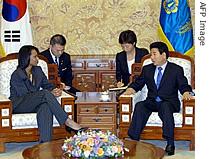-
(单词翻译:双击或拖选)
By Kurt Achin
Seoul
19 October 2006
The United States and South Korea are discussing how to implement1 last week's U. N. Security Council resolution imposing2 sanctions on North Korea. The two countries' top diplomats3 warn of grave consequences, if North Korea does not halt its nuclear testing.
----
 South Korean President Roh Moo-Hyun (R) talks with Condoleezza Rice (L) during their meeting at presidential Blue House in Seoul, Oct. 19, 2006 |
||
Speaking together to reporters here in Seoul, they expressed a shared belief that Pyongyang must return unconditionally4 to multinational5 talks aimed at ending its nuclear programs.
Rice and Ban made it clear, however, that they were still searching for ways to implement the sanctions that the U.N. imposed after last week's North Korean first-ever nuclear test.
The resolution, among other things, calls on members to prevent North Korea from proliferating6 nuclear weapons and technology. That could include searching North Korean cargo7 suspected of containing nuclear materials.
But Rice emphasized, as she did Wednesday during a visit to Tokyo, that the resolution did not call for a blockade of North Korea. She said the United States would not try to exacerbate8 an already tense situation.
"The idea that somehow we would want [Resolution] 1718 to be implemented9 in a way that escalates10 tensions on the Korean Peninsula, or on the high seas for that matter, simply could not be more wrong," she said. "What we want is effective implementation11."
She says scrutinizing12 North Korean cargo could be accomplished13 mainly in ports, with the help of intelligence and through technologies, such as radiation detectors14, rather than by interdictions on the high seas.
North Korea's neighbors have expressed concern that such interdictions could lead to clashes.
South Korea's Ban, who will soon take over as secretary-general of the United Nations, warned North Korea not to conduct further nuclear tests. He says, if the North does more testing, there will be more serious consequences.
Ban did say South Korea will re-evaluate two projects it has funded in the North, a tourist resort and a special economic zone, to see if their continued operation complies with the U.N. resolution.
The two diplomats, however, generally avoided providing specifics about what acts their two countries might take, individually or collectively.
Rice said the resolution had been passed relatively15 quickly following the North Korea test of October 9, and nations were still discussing how best to implement the resolution's provisions.
Rice is scheduled to travel to Beijing on Friday, and then to Russia.
 收听单词发音
收听单词发音
1
implement

|
|
| n.(pl.)工具,器具;vt.实行,实施,执行 | |
参考例句: |
|
|
|
2
imposing

|
|
| adj.使人难忘的,壮丽的,堂皇的,雄伟的 | |
参考例句: |
|
|
|
3
diplomats

|
|
| n.外交官( diplomat的名词复数 );有手腕的人,善于交际的人 | |
参考例句: |
|
|
|
4
unconditionally

|
|
| adv.无条件地 | |
参考例句: |
|
|
|
5
multinational

|
|
| adj.多国的,多种国籍的;n.多国籍公司,跨国公司 | |
参考例句: |
|
|
|
6
proliferating

|
|
| 激增( proliferate的现在分词 ); (迅速)繁殖; 增生; 扩散 | |
参考例句: |
|
|
|
7
cargo

|
|
| n.(一只船或一架飞机运载的)货物 | |
参考例句: |
|
|
|
8
exacerbate

|
|
| v.恶化,增剧,激怒,使加剧 | |
参考例句: |
|
|
|
9
implemented

|
|
| v.实现( implement的过去式和过去分词 );执行;贯彻;使生效 | |
参考例句: |
|
|
|
10
escalates

|
|
| v.(使)逐步升级( escalate的第三人称单数 );(使)逐步扩大;(使)更高;(使)更大 | |
参考例句: |
|
|
|
11
implementation

|
|
| n.实施,贯彻 | |
参考例句: |
|
|
|
12
scrutinizing

|
|
| v.仔细检查,详审( scrutinize的现在分词 ) | |
参考例句: |
|
|
|
13
accomplished

|
|
| adj.有才艺的;有造诣的;达到了的 | |
参考例句: |
|
|
|
14
detectors

|
|
| 探测器( detector的名词复数 ) | |
参考例句: |
|
|
|
15
relatively

|
|
| adv.比较...地,相对地 | |
参考例句: |
|
|
|















